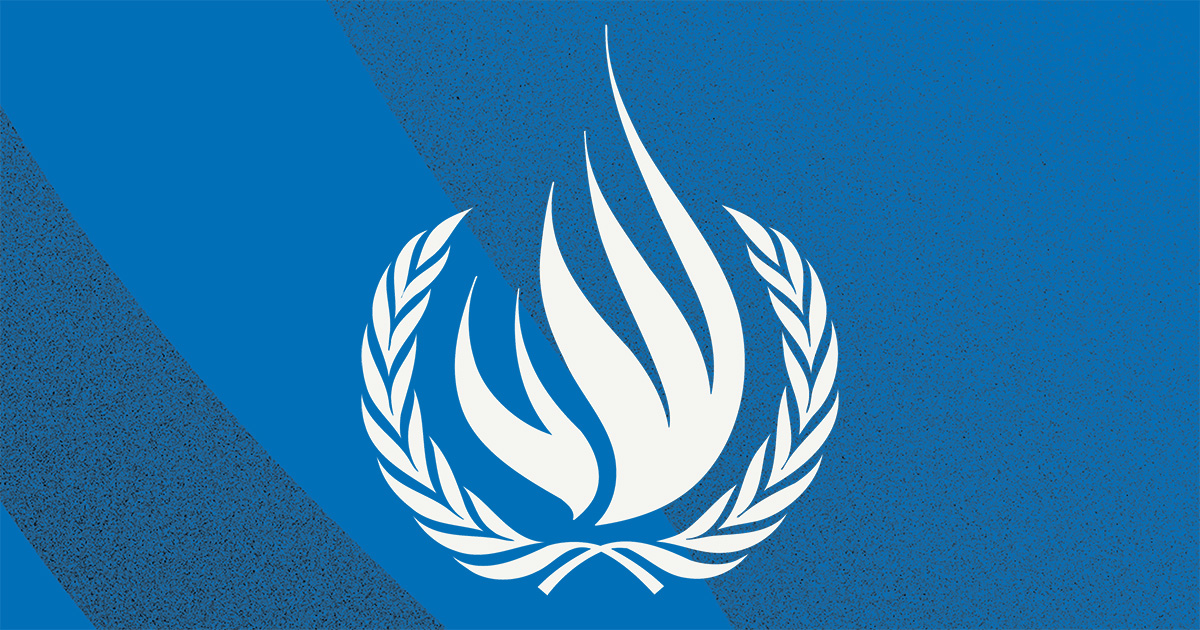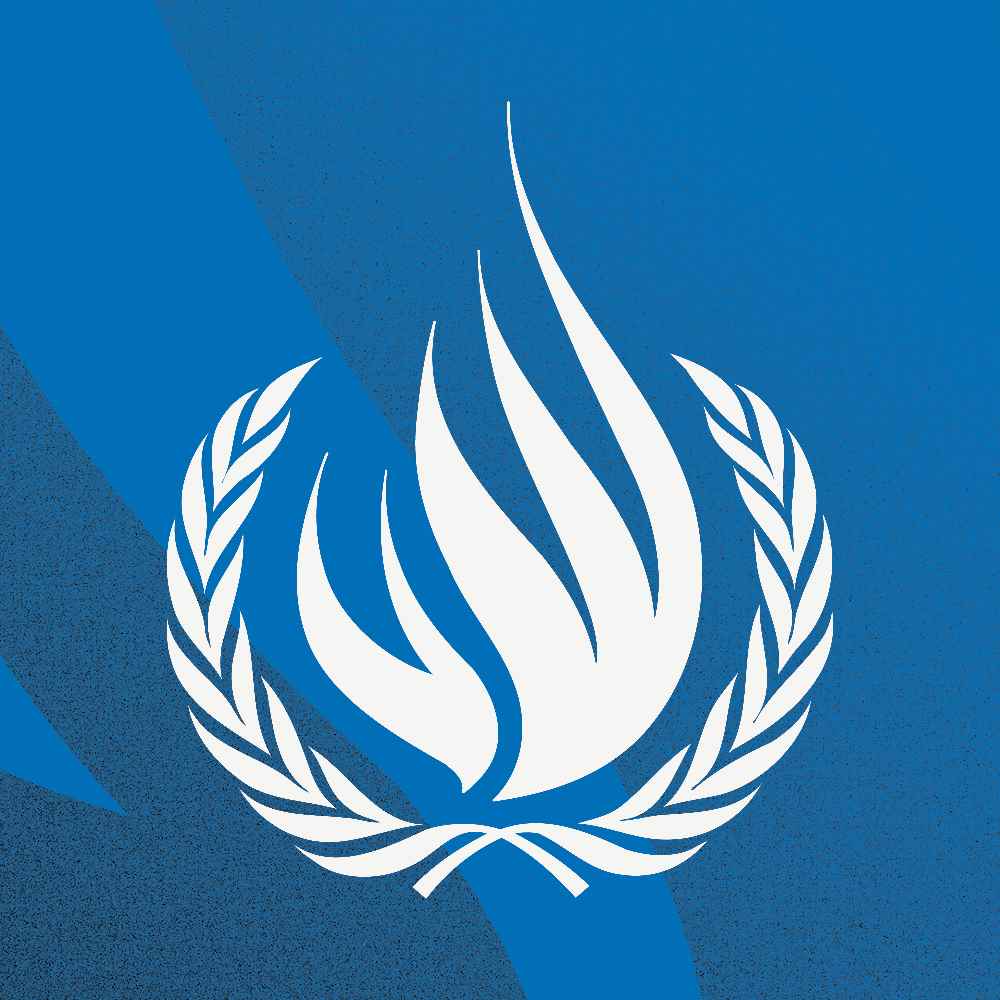
The Human Rights Council this afternoon started a general debate on the oral update of Michelle Bachelet, United Nations High Commissioner for Human Rights.
Ms. Bachelet presented her oral update as well as her reports on Colombia, Guatemala, Honduras, Venezuela, Cyprus, Eritrea and on the COVID-19 pandemic in a previous meeting. A summary can be found here.
At the beginning of the meeting, Colombia, Guatemala, Honduras, Cyprus, Eritrea and Venezuela spoke as concerned countries.
In the general debate, some speakers praised the COVAX initiative, adding that the distribution of the COVID-19 vaccines must be fair, universal and inclusive of the poorest countries. They expressed concern about national monopolies concerning the COVID-19 vaccines, underlining that global safety and security depended on the health of everyone. Some speakers said Western countries continued to consider themselves as reference points for democracy and interfered in the affairs of other countries. There was a contradiction in using unilateral coercive measures in the name of human rights as such measures were detrimental to rights, including the right to health. A number of speakers said that a shadow pandemic loomed over the world: the global escalation in domestic violence, as victims were forced to stay at home with their abusers.
Speaking were China, Estonia (on behalf of Nordic-Baltic countries), Portugal (on behalf of the European Union), Gabon (on behalf of African group), Pakistan (on behalf of the Organization of Islamic Conference), China (on behalf of a group of countries), Uruguay (on behalf of a group of countries), Azerbaijan (on behalf of the Non-Aligned Movement), Netherlands (on behalf of a group of countries), Brunei Darussalam (on behalf of the Association of Southeast Asian Nations), Timor-Leste (on behalf of a group of countries), Germany (on behalf of a group of countries), Senegal (on behalf of a group of countries), Germany, France, Armenia, Togo, Venezuela, Libya, Indonesia, Senegal, Russian Federation, Japan, Netherlands, India, Namibia, Denmark, Burkina Faso, Pakistan, Republic of Korea, Ukraine, Bahrain, Cameroon, Nepal, Austria, Italy, Poland, Bolivia, United Kingdom, Sudan, Cuba, Bangladesh, Côte d"Ivoire, Czech Republic, Philippines, Brazil, Canada, Finland, Qatar, Liechtenstein, Kuwait, Food and Agriculture Organization, Greece, Belgium, Iraq, Switzerland, Slovenia, Jordan, Australia, Ecuador, Portugal, Morocco, Maldives, Sweden, Malaysia, Democratic People"s Republic of Korea, South Africa, Iran, Malta, El Salvador, Norway, Egypt, United States, Thailand, Sri Lanka, Spain, Zambia, Chile, Algeria, Albania, and United Arab Emirates.
Human rights issues in or concerning the following countries and areas were raised: Cambodia, Viet Nam, Honduras, Guatemala, Colombia, Cameroon, Guinea, Saudi Arabia, Iraq, Nagorno-Karabakh, Morocco, Western Sahara, occupied Palestinian territories and East Jerusalem, Jammu and Kashmir, Myanmar, Afghanistan, Iran, Russian Federation, Belarus, Nicaragua, Turkey, Azerbaijan, Hong Kong, Venezuela, Ukraine, Estonia, Latvia, Lithuania, United Kingdom, Tigray, Zimbabwe, Sri Lanka, Burundi, Libya, Yemen, Crimean Peninsula, Uganda, Nigeria, United States, Democratic Republic of Congo, Syria, Cyprus, Central African Republic, Chad, Poland, Philippines, Tanzania, Cuba, Burundi, Democratic People’s Republic of Korea, El Salvador, Eritrea, South Sudan and China.
Armenia, Togo, Venezuela, Indonesia, India, Burkina Faso, Ukraine, Bahrain, Cameroon, Nepal, Sudan, Cuba, Côte d’Ivoire, Brazil, Canada, Qatar, Greece, Iraq, Jordan, Ecuador, Morocco, Maldives, South Africa, Iran, Egypt, Thailand, Algeria and United Arab Emirates spoke about the human rights situation in their own countries.
Saudi Arabia took the floor in a point of order.
The webcast of the Human Rights Council meetings can be found here. All meeting summaries can be found here. Documents and reports related to the Human Rights Council’s forty-sixth regular session can be found here.
The Council will next meet at 10 a.m. on Monday, 1 March when it will start its annual meeting on the rights of the child with a panel discussion on the rights of the child and the Sustainable Development Goals. This will be followed by the continuation of the general debate on the High Commissioner’s oral update.
General Debate on the High Commissioner’s Oral Update
Michelle Bachelet, High Commissioner for Human Rights, presented her oral update as well as her reports on Colombia, Guatemala, Honduras, Venezuela, Cyprus, Eritrea and on the COVID-19 pandemic in a previous meeting. A summary can be found here.
Statements by Concerned Countries
Colombia, speaking as a concerned country, stated that it had been fully complying with the Final Agreement signed by the National Government and the former Revolutionary Armed Forces of Colombia in 2016, providing a substantial boost to its implementation. Few countries in the world were as open to international human rights scrutiny as Colombia, evidenced by the highly active High Commissioner country office in Colombia, the largest in Latin America. The homicide rate per 100,000 inhabitants had been steadily declining, but Colombia was aware of the seriousness of the threats against social leaders, caused by organized armed and criminal groups, including members of the former Revolutionary Armed Forces of Colombia who had never surrendered their weapons.
Guatemala, speaking as a concerned country, stated that the report should have had a greater focus on the efforts undertaken in response to the COVID-19 pandemic, as it exacerbated long term challenges. Guatemala recognized the leadership of the High Commissioner’s Office in the country by Mika Kanervavouri and reiterated that technical assistance should be in line with the Government’s priorities. As such, Guatemala underlined its multicultural and plurilingual nature, noting that attention to indigenous peoples, women and girls, and persons with disabilities was crucial. Migration should be an option, not a necessity, and Guatemala maintained a firm commitment to the right to safe, orderly and regular migration.
Honduras, speaking as a concerned country, said it took note of the recommendations of the annual report and agreed that the impact of the COVID-19 pandemic and tropical storms ETA and IOTA had generated new and important challenges in terms of human rights, especially for groups in vulnerable situations, widening the gaps in matters of health, education, and work, among others. Therefore, the State had taken appropriate measures to guarantee the enjoyment of such rights through the creation and implementation of different mechanisms such as the Debt Relief Programme. In particular, with the support of the United Nations in Honduras, work was currently being done on the formulation of the National Reconstruction and Sustainable Development Plan, which included human rights and gender equity as one of the cross-cutting axes. Honduras reiterated its commitment to the application of the United Nations Guiding Principles on Business and Human Rights.
Cyprus, speaking as a concerned country, reiterated its full support for the mandate of the Office of the High Commissioner, but expressed its deepest disappointment that the report had deviated from this mandate, which focused on the mass human rights violations arising from the 1974 Turkish invasion, yet another year. Cyprus noted that it was deeply regrettable that there was no mention of the vital need to grant Cyprus access to the Turkish archives in relation to burial sites. The report failed to address the reasons for the displacement of Greek Cypriots from Turkish-occupied areas, overlooked the hardships endured by the enclaved and the Greek Orthodox faithful in occupied areas. The opening of Varosha beach was a violation of international law.
Eritrea, speaking as a concerned country, said the report attempted to portray a dark picture and essentially repeat the fallacious narratives advanced by the European Union and other Western countries. This was not new, as the core group of Western countries had made it a habit to sully the image of Eritrea and coerce it. The allegations levelled by Eritrea’s archenemies and the European Union and the Office highlighting the defamatory portrayal of sexual violence, looting and crimes by the Eritrean army in the pretext of Ethiopia’s rule of law operations in the Tigray region of Ethiopia were baseless. The Office should refrain from making hasty decisions based on unaccounted and unverified allegations. Attempts to deflect attention from the high crimes perpetrated by the Tigray People"s Liberation Front clique and downplay its culpability would not serve the cause of peace, security, human rights and development
Venezuela, speaking as a concerned country, noted that unfortunately, the illegal unilateral coercive measures imposed by the United States Government and some of its allies had intensified. The preliminary report of the Special Rapporteur on unilateral coercive measures after his visit demonstrated the devastating impact of such measures that were affecting the whole range of human rights in Venezuela. Sanctions had also undermined the infrastructure of Venezuela and had led to the forced migration of thousands of Venezuelans for economic reasons. In the context of the COVID-19 pandemic, these illegal measures imposed by the United States were a crime against humanity. Progress in the area of human rights was evident since the last presentation of the High Commissioner, evidenced by the active implementation of the Work Plan within the nine new areas of action. Despite the immense challenges faced by the country, Venezuela pledged to not diminish its cooperation with the Office of the High Commissioner.
General Debate
Speakers said the full participation of women and girls at all levels was required to build back better. The instrumentalization of the Council should be avoided as it was counterproductive. Xenophobia, Islamophobia and racism remained a concern. Some speakers called on States to reaffirm their commitments made in the Declaration on the Right to Development. Efforts should be made to ensure that the current crisis would not lead to a structural weakening of the human rights treaty bodies, which should be given a budget commensurate with their vital role. Speakers highlighted the role of the Office of the High Commissioner in the area of responsibility to protect and prevent human rights violations. Some speakers recognized that no State had a perfect human rights record, pledging to engage with the Council in good faith and avoid procedural tactics designed to block action. The funding to the human rights pillar from the United Nations budget had to be increased, speakers said as they called on States to increase their voluntary contributions.
The COVAX initiative was praised by some speakers who noted that the distribution of the COVID-19 vaccines must be fair, universal and inclusive of the poorest countries. They expressed concern about national monopolies concerning the COVID-19 vaccines, underlining that global safety and security depended on the health of everyone. Some speakers said Western countries continued to consider themselves as reference points for democracy and interfered in the affairs of other countries. There was a contradiction in using unilateral coercive measures in the name of human rights as such measures were detrimental to rights, including the right to health. Some speakers said a shadow pandemic loomed over the world: the global escalation in domestic violence, as victims were forced to stay at home with their abusers. Sexual health and abortion rights were human rights, some speakers emphasised. Some speakers warned against restrictions on the flow of information, such as Internet shutdowns; in that regard digital platforms managed by private actors should be better managed. Human rights defenders must be protected, as they pushed everyone to do better.
Human rights issues in or concerning the following countries and areas were also raised: Cambodia, Viet Nam, Honduras, Guatemala, Colombia, Cameroon, Guinea, Saudi Arabia, Iraq, Nagorno-Karabakh, Morocco, Western Sahara, occupied Palestinian territories and East Jerusalem, Jammu and Kashmir, Myanmar, Afghanistan, Iran, Russian Federation, Belarus, Nicaragua, Turkey, Azerbaijan, Hong Kong, Venezuela, Ukraine, Estonia, Latvia, Lithuania, United Kingdom, Tigray, Zimbabwe, Sri Lanka, Burundi, Libya, Yemen, Crimean Peninsula, Uganda, Nigeria, United States, Democratic Republic of Congo, Syria, Cyprus, Central African Republic, Chad, Poland, Philippines, Tanzania, Cuba, Burundi, Democratic People’s Republic of Korea, El Salvador, Eritrea, South Sudan and China.
Armenia, Togo, Venezuela, Indonesia, India, Burkina Faso, Ukraine, Bahrain, Cameroon, Nepal, Sudan, Cuba, Côte d’Ivoire, Brazil, Canada, Qatar, Greece, Iraq, Jordan, Ecuador, Morocco, Maldives, South Africa, Iran, Egypt, Thailand, Algeria and United Arab Emirates spoke about the human rights situation in their own countries.
Link: https://www.ungeneva.org/en/news-media/meeting-summary/2021/02/human-rights-council-starts-general-debate-high-commissioners











